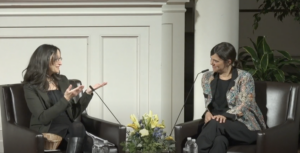
After thirty-six hours of travel, VALERIA LUISELLI arrived at Amherst College LitFest on a freezing Saturday night just in time to speak with The Common’s editor-in-chief JENNIFER ACKER. Their conversation explored the capacity of memory to shape geography, the relationship between language and home, and the architecture of a book. Luiselli also spoke with honesty and ardor about her research in and around the U.S.-Mexico borderlands and her experience as a legal translator for refugees, experiences informing her acclaimed novel Lost Children Archive. This interview is an edited and condensed version of the live conversation; read more about LitFest, and watch a video of the full conversation online.



